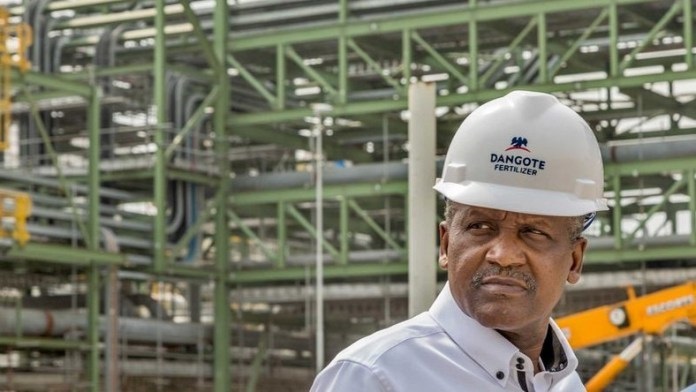Dangote Fertiliser plant has been identified as a crucial project that would spur the attainment of the United Nations Sustainable Development Goals (SDGs) as well as the realisation of the Africa Union Agenda 2063.
Charge D’Affaires, Embassy of Nigeria in Senegal, Mr A.K Zanna, stated this at his office in Dakar recently, while lauding the contributions of Dangote Cement’s investment in Senegal and Africa in general. He also said the realisation of the UN SDGs would not be possible without the use of fertiliser in crop production.
The Envoy also said the 650,000 barrels-per-day Dangote Petroleum Refinery, which has reached an advanced stage of construction in Lagos, Nigeria, would help to bridge the supply gap of Premium Motor Spirit (PMS), also known as petrol, in Africa.
According to him, the Africa Union Agenda 2063 and the UN Sustainable Development Goals are geared towards the promotion of food production and poverty alleviation. “You cannot promote food production without the application of fertiliser. I believe that the Dangote Fertiliser is going to assist food production in Africa.”
Zanna affirmed the belief that Africa will require increased food production in order to feed its growing population. “There is growing population in Africa, which means we also need sustainable food production. To increase food production, there should also be increase in yield and you cannot get increase in yield without adequate use of fertiliser. So, Dangote Fertiliser Plant is coming in handy for the promotion of the Africa Union Agenda 2063 in terms of increased food production,” he added.
The Dangote Fertiliser plant, which has been completed, is expected to manufacture 3 million metric tonnes of urea per annum, with a view to reducing Nigeria’s fertiliser imports, and generating $400m annual foreign exchange from export to Africa countries.
The plant, located in the Lekki Free Zone area of Lagos State, has been classified as the biggest project in the entire fertiliser industry history in the world, which would assist in attaining the United Nations SDGs.
The 17 SDGs are the blueprint to achieve a better and more sustainable future for all. They address global challenges, including poverty, inequality, climate change, environmental degradation, peace and justice. Africa Union Agenda 2063 is the continent’s strategic framework that aims to deliver on its goal for inclusive and sustainable development, and it is a vital manifestation of the pan-African drive for unity, self-determination, freedom, progress and collective prosperity.
Zanna also said that the establishment of the Dangote Oil Refinery in Lagos, would help address fuel challenge across the African continent.
He stated, “Although, there are refineries in Côte d’Ivoire, Senegal and Gabon which refine products, the capacity is not sufficient for the growing demand for fuel in the sub region. Therefore, the completion of Dangote Oil Refinery is going to eliminate the challenge of exporting crude oil to Europe and America and bringing refined products to Africa. Once we have the Dangote Refinery running, the challenges of fuel supply gap are going to be tackled.
“The Dangote Refinery is going to be a source of blessing to the whole of African countries, most especially, West Africa, due to member countries’ proximity to the Refinery in Nigeria. By the time the refinery comes on stream, I don’t think any country will like to go to Europe to import fuel when you can get the locally refined products in Africa. The refinery is definitely going to be a game changer and will address the challenge of fuel supply gap in Africa,” he added.
Country Manager, Dangote Cement, Senegal, Luk Haelterman attributed the success of the company in Senegal in the past five years to the company’s investment in quality production and introduction of what is commonly referred to as the ‘Senegallisation’ Policy.
According to him, the company’s introduction of 42.5-degree brand of cement to the major market in Senegal upon entry has enabled the company gain the desired market share in the country.
He stated: “The success of Dangote Cement is coming from quality planning based merely on the improvement on the quality of cement to 42.5R that was not available everywhere, and certainly not to everybody at affordable price in Senegal. Introducing this into the market was a guarantee for us to gain the market share that we needed.
“Secondly, without any doubt, is the creation of a very good team spirit and passionate involvement in aiming at continuous improvement towards excellence. When we entered the market, it was characterised by 32.5-grade cement. We supplied 42.5-grade cement at affordable price. Putting up quality gave us a chance to enter the market.”
Luk also disclosed that Dangote Cement Senegal has developed a culture of supporting local employees and prioritising local hiring, which allows local country employees obtain the requisite knowledge, experience, and support to take up key roles within the company.
He said the policy aims to gradually reduce the number of expatriates employed by the business by enhancing the skills and capacity of Senegalese employees to enable them take up leadership positions.
“We have ensured that our image has been aligned with two key principles from day one: maintaining high quality, and taking a local approach in everything that we do,” he said.


Comment here